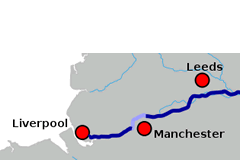A report headed by esteemed economist Jim O Neil caused a stir last week with the suggestion that the great cities of Manchester and Liverpool should merge.
The City Growth Commission, an independent inquiry aimed at trying to boost urban growth in our major cities, suggests that ‘Manpool’ would enable the two Northwest giants to economically compete on the global stage more effectively by coming together, and help to begin to address the growing North –South divide which I wrote about here.
The argument goes that by creating a Northern super city we will see a genuine competitor to London, a capital city whose population and economic activity positively dwarves all other UK core cities.
As much as aggregating the might of Manchester and Liverpool would undoubtedly establish an economic juggernaut for the region, the practicalities of bringing the two traditional rivals together in a formal administrative sense would be challenging if not impossible. You only have to look at the deranged lobbying that took place over the name of the proposed Liverpool city region Combined Authority to see how difficult parochial local politicians find it to give up ‘power’ for the greater good.
Nonetheless, there is every prospect, indeed already existing evidence, that on issues of strategic economic importance significant co-operation takes place between Manchester and Liverpool. The two major transport infrastructure projects HS2 and the ‘Northern Hub’ are the most obvious, though not exclusive, examples.
Even on the international stage there is sharing of platforms and resource. The chief executive of Manchester city council and the mayor of Liverpool will share a stage in MIPIM next week. And Manchester is a key partner in the forthcoming International Festival of Business to be hosted in Liverpool.
So though a formal coming together of the two cities is as likely as Luis Suarez signing for Manchester United, the agenda for even greater collaboration should be explored and progressed.
However, why stop at Manchester and Liverpool? In both those transport infrastructure projects mentioned Leeds is a key partner too. And the attractiveness of a great northern economic hub, with three major conurbations working together rather than two, is a powerful and surely more compelling option.
By coming together to form a triumvirate of the north, Manchester, Liverpool and Leeds could accelerate the work that they do together already, and extend it. Motorway connectivity is a major issue that can only be genuinely addressed by all three cities working in partnership and finding and funding a solution.
What of aviation? Is the wider region capable of sustaining three airports without greater dialogue between Leeds Bradford, John Lennon and Manchester Airport Group?
Beyond transport, there are many cultural and social projects where greater collaboration and a pooling of resource could bring benefit to the entire region.
Another area where the three cities are already at one is in their call for devolved powers, budgets and responsibilities. Ultimately this is the key that will truly unlock the potential of our great cities and begin to close the unhealthy gap that exists between London and the rest of us.




